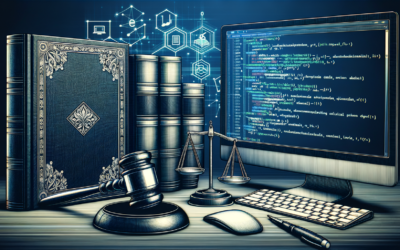Egouvernance
In the digital age, the term “Egovernance” is gaining in popularity within public administrations and companies worldwide. It represents a revolution in the way institutions interact with citizens and conduct their internal operations.
What is Egouvernance?
Egovernance, or electronic governance, refers to the use of information and communication technologies (ICT) to improve public administration services and facilitate government processes. Its main objective is to be efficient, transparent and provide services to citizens in an inclusive and equitable way. In this context, contract lifecycle management and legal project management take on a new dimension, where automation and optimization are paramount.
The benefits of Egouvernance
The use of digital tools in governance offers many advantages. These include greater efficiency in public services thanks to dematerialization and predictive analysis, simplification of procedures that benefit businesses and individuals alike, and greater transparency leading to a potential reduction in corruption.
Improved transparency
Transparency is one of the cornerstones of Egouvernance. This is ensured by making government information available online, making it easily accessible to all citizens. What’s more, thanks to advances in blockchain, transactions and operations are recorded reliably and securely.
Economies of scale
Egouvernance also generates significant savings. By replacing paper-based processes with digital solutions, file processing costs are significantly reduced. What’s more,digital ethics and the digitization of labor law are helping to optimize human resources.
Implementation challenges
Despite its many advantages, the introduction of Egovernance also raises challenges. The need for a reliable digital infrastructure, the protection of personal data and the digitization of legal processes are major concerns. This observation is all the more relevant when it comes to discussions around RGPD compliance and legal cybersecurity.
Security and confidentiality issues
Information systems security is crucial when dealing with sensitive data. Institutions must therefore have a legal cloud storage strategy andlegal algorithms that guarantee the integrity and confidentiality of information.
The importance of accessibility
Another major challenge is accessibility. For Egovernance to be truly inclusive, it must be accessible to all citizens, including those who are unfamiliar with digital technologies or who live in areas with limited infrastructure.
The role of new technologies
Egovernance relies heavily on technological innovations. Fromartificial intelligence to automation, modern tools offer solutions for more efficient and responsible governance.
Artificial Intelligence
AI has the potential to transform governance by enabling faster, data-driven decision-making. Data law and jurimetry are examples of AI applications that optimize the efficiency of legal and administrative services.
Blockchain and Smart Contracts
Blockchain technologies and smart contracts offer the advantages of verifiability and automatic execution of agreements, essential for transparent Egovernance free from unnecessary litigation.
Frequently asked questions
Here is a list of frequently asked questions for Egouvernance.
What are the benefits of Egouvernance for citizens?
Egovernance makes public services more accessible, faster and less error-prone, while enhancing transparency and encouraging citizen participation.
How does Egouvernance promote transparency?
It promotes transparency by making government information widely available online and using tools like blockchain to guarantee data integrity.
Is data security an issue in Egouvernance?
Yes, data protection is essential. Strict cybersecurity standards and legal compliance are essential to protect citizens’ data.




